 полная версия
полная версияThe Classic Myths in English Literature and in Art (2nd ed.) (1911)

Fig. 47. Io, Argus, and Mercury
Jupiter, grieved by the sufferings of his mistress, sent Mercury to dispatch Argus. Mercury took his sleep-producing wand and presented himself on earth as a shepherd driving his flock. As he strolled, he blew upon his syrinx or Pandean pipes. Argus listened with delight. "Young man," said he, "come and take a seat by me on this stone. There is no better place for your flock to graze in than hereabouts, and here is a pleasant shade such as shepherds love." Mercury sat down, talked, told stories till it grew late, and played upon his pipes his most soothing strains, hoping to lull the watchful eyes to sleep, but in vain; for Argus still contrived to keep some of his eyes open, though he shut the rest.
But among other stories, Mercury told him how the instrument on which he played was invented. "There was a certain nymph," said he, "whose name was Syrinx, – much beloved by the satyrs and spirits of the wood. She would have none of them, but was a faithful worshiper of Diana and followed the chase. Pan, meeting her one day, wooed her with many compliments, likening her to Diana of the silver bow. Without stopping to hear him she ran away. But on the bank of the river he overtook her. She called for help on her friends, the water-nymphs. They heard and consented. Pan threw his arms around what he supposed to be the form of the nymph and found he embraced only a tuft of reeds. As he breathed a sigh, the air sounded through the reeds and produced a plaintive melody. Whereupon the god, charmed with the novelty and with the sweetness of the music, said, 'Thus, then, at least, you shall be mine.' Taking some of the reeds of unequal lengths and placing them together, side by side, he made an instrument and called it Syrinx, in honor of the nymph." Before Mercury had finished his story he saw the eyes of Argus all asleep. At once he slew him and set Io free. The eyes of Argus Juno took and scattered as ornaments on the tail of her peacock, where they remain to this day.
But the vengeance of Juno was not yet satiated. She sent a gadfly to torment Io, who, in her flight, swam through the sea, named after her, Ionian. Afterward, roaming over many lands, she reached at last the banks of the Nile. Then Jupiter interceded for her; and upon his engaging not to pay her any further attention, Juno consented to restore her to her form.
In a poem dedicated to Leigh Hunt, by Keats, the following allusion to the story of Pan and Syrinx occurs:
So did he feel who pulled the boughs aside,That we might look into a forest wide, …Telling us how fair trembling Syrinx fledArcadian Pan, with such a fearful dread.Poor nymph – poor Pan – how he did weep to findNought but a lovely sighing of the windAlong the reedy stream; a half-heard strain,Full of sweet desolation, balmy pain.58. Callisto of Arcadia was another maiden who excited the jealousy of Juno. Her the goddess changed into a bear. Often, frightened by the dogs, Callisto, though lately a huntress, fled in terror from the hunters. Often, too, she fled from the wild beasts, forgetting that she was now a wild beast herself; and, bear as she was, she feared the bears.
One day a youth espied her as he was hunting. She saw him and recognized him as her son Arcas, grown to manhood. She stopped and felt inclined to embrace him. He, alarmed, raised his hunting spear and was on the point of transfixing her, but Jupiter arrested the crime and, snatching away both of them, placed them in the heavens as the Great and Little Bear.
Juno, enraged at seeing her rival so set in honor, hastened to ancient Tethys and Oceanus and, complaining that she was supplanted in Heaven, cried, "So do my punishments result – such is the extent of my power! I forbade her to wear human form, – she and her hateful son are placed among the stars. Better that she should have resumed her former shape, as I permitted Io to do. Perhaps my husband means to take her to wife, and put me away! But you, my foster parents, if you feel for me, and see with displeasure this unworthy treatment of me, show it, I beseech you, by forbidding this guilty couple from coming into your waters." The powers of the Ocean assented, and consequently the two constellations of the Great and Little Bear move round and round in the neighborhood of the pole, but never sink, as do the other stars, beneath the Ocean.67
59. Europa was the daughter of Agenor, king of Phœnicia, son of the god Neptune. The story of Jupiter's love for her is thus told by the idyllic poet, Moschus:
To Europa, princess of Asia, once on a time, a sweet dream was sent by Cypris… Then she beheld two continents at strife for her sake, Asia and the further shore, both in the shape of women. Of these one had the guise of a stranger, the other of a lady of that land, and closer still she clung about her maiden, and kept saying how she was her mother, and herself had nursed Europa. But that other with mighty hands, and forcefully, kept haling the maiden, nothing loth; declaring that, by the will of ægis-bearing Jupiter, Europa was destined to be her prize.
But Europa leaped forth from her strown bed in terror, with beating heart, in such clear vision had she beheld the dream… And she said, "Ah! who was the alien woman that I beheld in my sleep? How strange a longing for her seized my heart, yea, and how graciously she herself did welcome me, and regard me as it had been her own child! Ye blessed gods, I pray you, prosper the fulfillment of the dream!"
Therewith she arose, and began to seek the dear maidens of her company, girls of like age with herself, born in the same year, beloved of her heart, the daughters of noble sires, with whom she was always wont to sport, when she was arrayed for the dance, or when she would bathe her bright body at the mouths of the rivers, or would gather fragrant lilies on the leas…
Now the girls, so soon as they were come to the flowering meadows, took great delight in various sorts of flowers, whereof one would pluck sweet-breathed narcissus, another the hyacinth, another the violet, a fourth the creeping thyme; and on the ground there fell many petals of the meadows rich with spring. Others, again, were emulously gathering the fragrant tresses of the yellow crocus; but in the midst of them all the princess culled with her hand the splendor of the crimson rose, and shone preëminent among them all like the foam-born goddess among the Graces. Verily, she was not for long to set her heart's delight upon the flowers… For of a truth, the son of Cronus, so soon as he beheld her, was troubled, and his heart was subdued by the sudden shafts of Cypris, who alone can conquer even Jupiter. Therefore, both to avoid the wrath of jealous Juno, and being eager to beguile the maiden's tender heart, he concealed his godhead, and changed his shape, and became a bull…
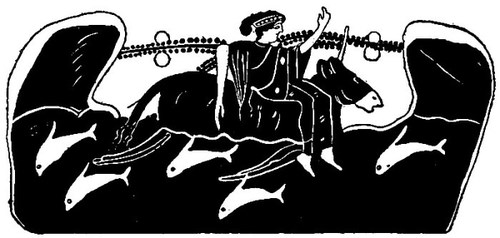
Fig. 48. Europa on the Bull
He came into the meadow, and his coming terrified not the maidens, nay, within them all wakened desire to draw nigh the lovely bull, and to touch him, and his heavenly fragrance was scattered afar, exceeding even the sweet perfume of the meadows. And he stood before the feet of fair Europa, and kept licking her neck, and cast his spell over the maiden. And she still caressed him, and gently with her hands she wiped away the deep foam from his lips, and kissed the bull. Then he lowed so gently, ye would think ye heard the Mygdonian flute uttering a dulcet sound.
He bowed himself before her feet, and bending back his neck, he gazed on Europa, and showed her his broad back. Then she spake among her deep-tressed maidens, saying, —
"Come, dear playmates, maidens of like age with me, let us mount the bull here and take our pastime, for, truly, he will bear us on his back, and carry all of us! And how mild he is, and dear, and gentle to behold, and no whit like other bulls! A mind as honest as a man's possesses him, and he lacks nothing but speech."
So she spake, and smiling, she sat down on the back of the bull, and the others were about to follow her. But the bull leaped up immediately, now he had gotten her that he desired, and swiftly he sped to the deep. The maiden turned, and called again and again to her dear playmates, stretching out her hands, but they could not reach her. The strand he gained, and forward he sped like a dolphin, faring with unwetted hooves over the wide waves. And the sea, as he came, grew smooth, and the sea monsters gamboled around, before the feet of Jupiter; and the dolphin rejoiced, and rising from the deeps, he tumbled on the swell of the sea. The Nereïds arose out of the salt water, and all of them came on in orderly array, riding on the backs of sea beasts. And himself, the thunderous shaker of the world, appeared above the sea, and made smooth the wave, and guided his brother on the salt sea path, and round him were gathered the Tritons, these hoarse trumpeters of the deep, blowing from their long conchs a bridal melody.
Meanwhile, Europa, riding on the back of the divine bull, with one hand clasped the beast's great horn, and with the other caught up the purple fold of her garment, lest it might trail and be wet in the hoar sea's infinite spray. And her deep robe was swelled out by the winds, like the sail of a ship, and lightly still did waft the maiden onward. But when she was now far off from her own country, and neither sea-beat headland nor steep hill could now be seen, but above, the air, and beneath, the limitless deep, timidly she looked around, and uttered her voice, saying, —
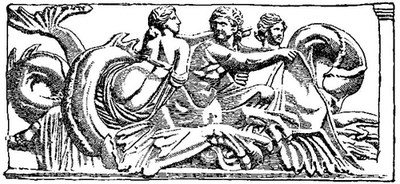
Fig. 49. Nereïds on Sea Beasts
"Whither bearest thou me, bull god? What art thou? How dost thou fare on thy feet through the path of the sea beasts, nor fearest the sea? The sea is a path meet for swift ships that traverse the brine, but bulls dread the salt sea ways. What drink is sweet to thee, what food shalt thou find from the deep? Nay, art thou then some god, for godlike are these deeds of thine." …
So spake she, and the horned bull made answer to her again: "Take courage, maiden, and dread not the swell of the deep. Behold, I am Jupiter, even I, though, closely beheld, I wear the form of a bull, for I can put on the semblance of what thing I will. But 'tis love of thee that has compelled me to measure out so great a space of the salt sea, in a bull's shape. So Crete shall presently receive thee, Crete that was mine own foster-mother, where thy bridal chamber shall be."68
According to tradition, from this princess the continent of Europe acquired its name. Her three sons are famous in Greek myth: Minos, who became king of Crete, and after his death a judge in the lower world; Rhadamanthus, who also was regarded as king and judge in the world of ghosts; and Sarpedon, who was ancestor of the Lycians.
The adventures of Europa's brother Cadmus, who by the command of his father went forth in quest of the lost maiden, fall under the myths of Mars.69
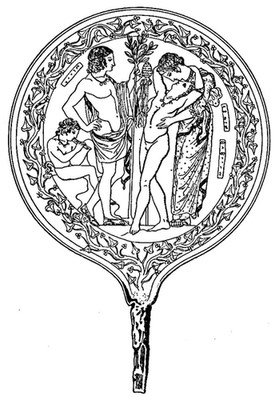
Fig. 50. Bacchus embracing Semele
60. Semele was the daughter of Cadmus, founder of Thebes. She was descended, through both parents, from the gods; for her mother Harmonia was daughter to Mars and the laughter-loving Venus. To Semele Jupiter had appeared, and had paid court in unostentatious manner and simple guise. But Juno, to gratify her resentment against this new rival for her lord's affections, contrived a plan for her destruction. Assuming the form of Beroë, the aged nurse of Semele, she insinuated doubts whether it was indeed Jove himself who came as a lover. Heaving a sigh, she said, "I hope it will turn out so, but I can't help being afraid. People are not always what they pretend to be. If he is indeed Jove, make him give some proof of it. Ask him to come arrayed in all his splendors, such as he wears in Heaven. That will put the matter beyond a doubt." Semele was persuaded to try the experiment. She asks a favor, without naming what it is. Jove gives his promise, and confirms it with the irrevocable oath, attesting the river Styx, terrible to the gods themselves. Then she made known her request. The god would have stopped her as she spake, but she was too quick for him. The words escaped, and he could neither unsay his promise nor her request. In deep distress he left her and returned to the upper regions. There he clothed himself in his splendors, not putting on all his terrors, as when he overthrew the giants, but what is known among the gods as his lesser panoply. With thunders and lightnings he entered the chamber of Semele. Her mortal frame could not endure the splendors of the immortal radiance. She was consumed to ashes.70 Her son was the god Bacchus.71 Semele, in the blissful seats of Heaven, whither she was transported by the sorrowful Jove, has been represented as recounting thus the story of her doom:
What were the garden-bowers of Thebes to me?What cared I for their dances and their feasts,Whose heart awaited an immortal doom?The Greek youths mocked me, since I shunned in scornThem and their praises of my brows and hair.The light girls pointed after me, who turnedSoul-sick from their unending fooleries…There came a change: a glory fell to me.No more 'twas Semele, the lonely girl,But Jupiter's Beloved, Semele.With human arms the god came clasping me:New life streamed from his presence; and a voice,That scarce could curb itself to the smooth Greek,Now and anon swept forth in those deep nights,Thrilling my flesh with awe; mysterious words —I knew not what; hints of unearthly thingsThat I had felt on solemn summer noons,When sleeping Earth dreamed music, and the heartWent crooning a low song it could not learn,But wandered over it, as one who gropesFor a forgotten chord upon a lyre.Yea, Jupiter! But why this mortal guise,Wooing as if he were a milk-faced boy?Did I lack lovers? Was my beauty dulled,The golden hair turned dross, the lithe limbs shrunk?The deathless longings tamed, that I should seetheMy soul in love like any shepherd girl?One night he sware to grant whate'er I asked:And straight I cried, "To know thee as thou art!To hold thee on my heart as Juno does!Come in thy thunder – kill me with one fierceDivine embrace! – Thine oath! – Now, Earth, at last!"The Heavens shot one swift sheet of lurid flame;The world crashed: from a body scathed and tornThe soul leapt through, and found his breast, and died.Died? – So the Theban maidens think, and laugh,Saying, "She had her wish, that Semele!"But sitting here upon Olympus' height,I look down, through that oval ring of stars,And see the far-off Earth, a twinkling speck —Dust-mote whirled up from the Sun's chariot wheel —And pity their small hearts that hold a manAs if he were a god; or know the god —Or dare to know him – only as a man!O human love! art thou forever blind?7261. Ægina. The extent to which those who were concerned only indirectly in Jupiter's love affairs might yet be involved in the consequences of them is illustrated by the fortunes of Ægina. This maiden, the daughter of Asopus, a river-god, attracted the attention of Jupiter, who straightway ran off with her. Now, on the one hand, Sisyphus, king of Corinth, having witnessed the intrigue, was indiscreet enough to disclose it. Forthwith the vengeance of the king of gods and men fell upon him. He was condemned to Hades and, attempting to escape thence, had resort to a series of deceptions that resulted in his eternal punishment.73 On the other hand, the inhabitants of the island that had the misfortune to bear Ægina's name incurred the displeasure of Juno, who devastated their land with a plague. The following account of this calamity is placed in the mouth of Æacus, king of the island:74
"At the beginning the sky seemed to settle down upon the earth and thick clouds shut in the heated air. For four months together a deadly south wind prevailed. The disorder affected the wells and springs. Thousands of snakes crept over the land and shed their poison in the fountains. The force of the disease was first spent on the lower animals, – dogs, cattle, sheep, and birds. The oxen fell in the midst of their work. The wool dropped from the bleating sheep. The horse groaned at his stall and died an inglorious death. Everything languished; dead bodies lay in the roads, the fields, and the woods; the air was poisoned by them. Next the disease attacked the country people, and then the dwellers in the city. At first the cheek was flushed and the breath drawn with difficulty. The tongue grew rough and swelled, and the dry mouth stood open, with its veins enlarged, and gasped for the air. Men could not bear the heat of their clothes or their beds, but preferred to lie on the bare ground. Nor could the physicians help, for the disease attacked them also. At last men learned to look upon death as the only deliverer from disease. All restraint laid aside, they crowded round the wells and fountains, and drank, without quenching thirst, till they died. On all sides lay my people strewn like over-ripened apples beneath the tree, or acorns under the storm-shaken oak. You see yonder a temple on the height. It is sacred to Jupiter. Often, while the priest made ready for sacrifice, the victim fell, struck down by disease without waiting for the blow. At length all reverence for sacred things was lost. Bodies were thrown out unburied, wood was wanting for funeral piles, men fought with one another for the possession of them. Finally there were none left to mourn; sons and husbands, old men and youths, perished alike unlamented.
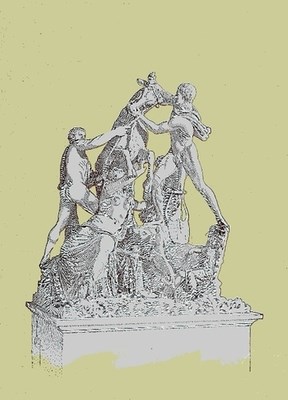
FARNESE BULL
"Standing before the altar, I raised my eyes to Heaven. 'O Jupiter,' I said, 'if thou art indeed my father, give me back my people, or take me also away!' At these words a clap of thunder was heard. 'I accept the omen,' I cried. By chance there grew by the place where I stood an oak with wide-spreading branches, sacred to Jupiter. I observed on it a troop of ants busy with their labor. Observing their numbers with admiration, I said, 'Give me, O father, citizens as numerous as these, and replenish my empty city.' The tree shook, and the branches rustled, though no wind agitated them. Night came on. The tree stood before me in my dreams, with its numerous branches all covered with living, moving creatures, which, falling to the ground, appeared to gain in size, and by and by to stand erect, and finally to assume the human form. Then I awoke. My attention was caught by the sound of many voices without. While I began to think I was yet dreaming, Telamon, my son, throwing open the temple gates, exclaimed, 'Father, approach, and behold things surpassing even your hopes!' I went forth; I saw a multitude of men, such as I had seen in my dream. While I gazed with wonder and delight, they approached and, kneeling, hailed me as their king. I paid my vows to Jove, and proceeded to allot the vacant city to the new-born race. I called them Myrmidons from the ant (myrmex), from which they sprang. They are a diligent and industrious race, eager to gain, and tenacious of their gains."
The Myrmidons were the soldiers of Achilles, the grandson of King Æacus, in the Trojan War.
62. Antiope was, according to the Odyssey, another daughter of Asopus, therefore a sister of Ægina. But later poets make this darling of Jove daughter of Nycteus, king of Thebes. While she was engaged in the Mænad dances, Jupiter as a satyr wooed and won her. She bore him two sons, Amphion and Zethus, who, being exposed at birth on Mount Cithæron, grew up among the shepherds, not knowing their parentage. After various adventures Antiope fell into the hands of her uncle Lycus, the usurping king of Thebes, who, egged on by his wife Dirce, treated her with extreme cruelty. Finally, when doomed by Dirce to be dragged to death behind a bull, Antiope found means to inform her children of her kinship to them. As it happened, they had been ordered to execute the cruel sentence upon their mother. But with a band of their fellow herdsmen, they attacked and slew Lycus instead, and, tying Dirce by the hair of her head to a bull, let her perish by her own device.75
While among the herdsmen, Amphion had been the special care of Mercury, who gave him a lyre and taught him to play upon it. His brother Zethus had occupied himself in hunting and tending the flocks. Amphion himself is one of the most famous of mythical musicians. Having become king of Thebes, it is said that when he played on his lyre, stones moved of their own accord and took their places in the wall with which he was fortifying the city.
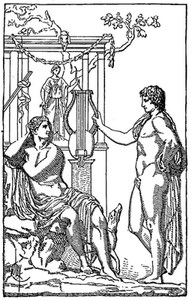
Fig. 51. Amphion and Zethus
… 'Tis said he had a tuneful tongue,Such happy intonation,Wherever he sat down and sungHe left a small plantation;Wherever in a lonely groveHe set up his forlorn pipes,The gouty oak began to move,And flounder into hornpipes.The mountain stirred its bushy crown,And, as tradition teaches,Young ashes pirouetted downCoquetting with young beeches;And briony-vine and ivy-wreathRan forward to his rhyming,And from the valleys underneathCame little copses climbing.The linden broke her ranks and rentThe woodbine wreaths that bind her,And down the middle, buzz! she wentWith all her bees behind her:The poplars, in long order due,With cypress promenaded,The shock-head willows, two and two,By rivers gallopaded.Came wet-shot alder from the wave,Came yews, a dismal coterie;Each plucked his one foot from the grave,Poussetting with a sloe-tree:Old elms came breaking from the vine,The vine streamed out to follow,And, sweating rosin, plumped the pineFrom many a cloudy hollow.And wasn't it a sight to see,When, ere his song was ended,Like some great landslip, tree by tree,The country-side descended;And shepherds from the mountain-eavesLooked down, half-pleased, half-frightened,As dashed about the drunken leavesThe random sunshine lightened.76
The musician's life was, however, not all harmony and happiness. Owing to the pride of his wife Niobe, daughter of King Tantalus, there befell him and his house a crushing calamity, which is narrated among the exploits of Apollo and Diana.
63. Jupiter, a Friend of Man. The kindly interest evinced by the Thunderer toward mortals is displayed in the story of Baucis and Philemon. Once on a time Jupiter, in human shape, visited the land of Phrygia, and with him Mercury, without his wings.
They presented themselves as weary travelers at many a door, seeking rest and shelter, but found all closed; for it was late, and the inhospitable inhabitants would not rouse themselves to open for their reception. At last a small thatched cottage received them, where Baucis, a pious old dame, and her husband Philemon had grown old together. Not ashamed of their poverty, they made it endurable by moderate desires and kind dispositions. When the two guests crossed the humble threshold and bowed their heads to pass under the low door, the old man placed a seat, on which Baucis, bustling and attentive, spread a cloth, and begged them to sit down. Then she raked out the coals from the ashes, kindled a fire, and prepared some pot-herbs and bacon for them. A beechen bowl was filled with warm water, that their guests might wash. While all was doing, they beguiled the time with conversation.
The old woman with trembling hand set the table. One leg was shorter than the rest, but a piece of slate put under restored the level. When it was steady she rubbed the table down with sweet-smelling herbs. Upon it she set some of chaste Minerva's olives, some cornel berries preserved in vinegar, and added radishes and cheese, with eggs lightly cooked in the ashes. The meal was served in earthen dishes; and an earthenware pitcher, with wooden cups, stood beside them. When all was ready the stew, smoking hot, was set on the table. Some wine, not of the oldest, was added, and for dessert, apples and wild honey.
Now while the repast proceeded, the old folks were astonished to see that the wine, as fast as it was poured out, renewed itself in the pitcher of its own accord. Struck with terror, Baucis and Philemon recognized their heavenly guests, fell on their knees, and with clasped hands implored forgiveness for their poor entertainment. There was an old goose, which they kept as the guardian of their humble cottage, and they bethought them to make this a sacrifice in honor of their guests. But the goose, too nimble for the old folk, with the aid of feet and wings eluded their pursuit and at last took shelter between the gods themselves. They forbade it to be slain, and spoke in these words: "We are gods. This inhospitable village shall pay the penalty of its impiety; you alone shall go free from the chastisement. Quit your house and come with us to the top of yonder hill." They hastened to obey. The country behind them was speedily sunk in a lake, only their own house left standing. While they gazed with wonder at the sight, that old house of theirs was changed. Columns took the place of the corner posts, the thatch grew yellow and appeared a gilded roof, the floors became marble, the doors were enriched with carving and ornaments of gold. Then spoke Jupiter in benignant accents: "Excellent old man, and woman worthy of such a husband, speak, tell us your wishes. What favor have you to ask of us?" Philemon took counsel with Baucis a few moments, then declared to the gods their common wish. "We ask to be priests and guardians of this thy temple, and that one and the same hour may take us both from life." Their prayer was granted. When they had attained a great age, as they stood one day before the steps of the sacred edifice and were telling the story of the place, Baucis saw Philemon begin to put forth leaves, and Philemon saw Baucis changing in like manner. While still they exchanged parting words, a leafy crown grew over their heads. "Farewell, dear spouse," they said together, and at the same moment the bark closed over their mouths. The Tyanean shepherd still shows the two trees, – an oak and a linden, standing side by side.77


